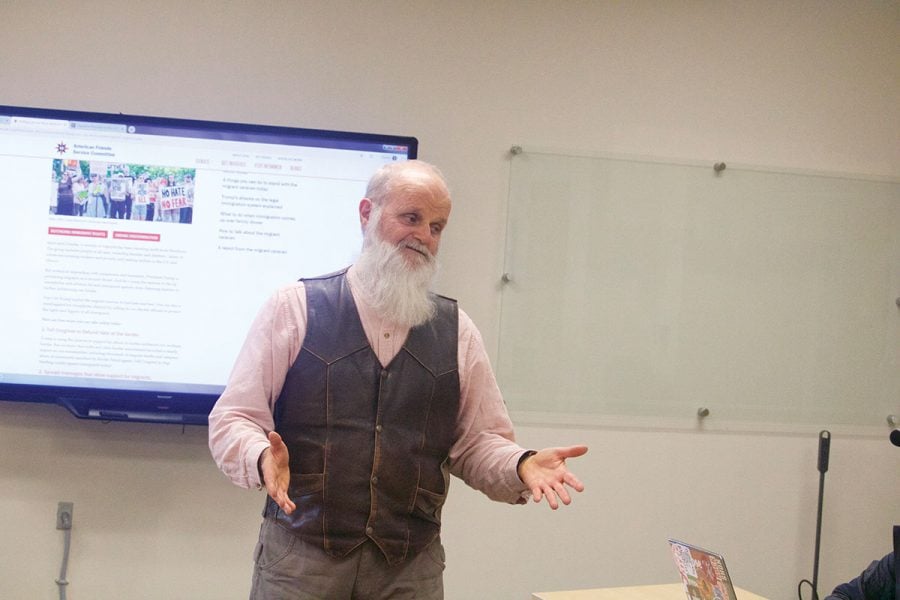Dr. Massey highlights lobbying politicians
On Tuesday, Nov. 27, Part-Time Lecturer for Religious Studies Dr. Frank Massey spoke at the Hege Library Experimental Classroom to inform students about lobbying the U.S. Congress for peace and justice in “Lobbying the U.S. Congress for Peace, Justice and Earth: The Friends Committee on National Legislation.” Massey stressed the impacts of lobbying congressmen and congresswomen on urgent topics to push forward important issues and policies through state and local representatives on the federal level.
The talk began with introductions from those in attendance, with each introduction including the individual’s name, where they are from, major and one issue that they think needs to be focused on in national legislature. Responses from the audience varied from environmental justice to access to affordable healthcare.
Discussion of the importance of these issues soon followed. However, many attendees expressed uncertainty when initially prompted to develop solutions to such topics of concern. The talk sought to address this uncertainty, emphasizing the need to make voices heard through communication with political representatives in advocating for change in national legislature or through physical activism.
The audience found the former option as being more promising, as one can communicate with their political representatives’ offices through a phone call or email.
Quaker-founded organizations, including the Friends Committee on National Legislation and the American Friends Service Committee, are two examples of paths that can be taken in order to bring about change to national legislation.
The FCNL works to inform and organize people in their lobbying efforts on Capitol Hill or online, explained Massey. The Committee on National Legislation seeks to provide a way for students to communicate and voice their concerns and opinions on current politics.
“The best time to straighten a tree is when it is young,” Massey said.
Throughout the talk, Massey advocated for lobbying on national legislation, expressing that the most important weapon in anyone’s arsenal is knowledge.
“Educate yourself,” Massey said, noting that not all issues can be addressed in the same way.
As an advocate of the FCNL, Massey described the importance of knowing and understanding personal boundaries and the limitations of lobbying. Massey went on to discuss a list created by the FCNL of ten current issues encouraged to be the focus of lobbying groups, shedding light on the limitations and exclusion of others. Domestic violence, discrimination and human rights were cited as topics of concern that were not included on the list.
“We (the FCNL) are only going to deal with the issues we can agree with,” Massey said. “We cannot solve everything, but we have picked 10 things, so we can make change. At least a small change.”
Massey brought attention to the importance, implications and impacts of lobbying. He emphasized the power embedded in persistent communication with local representatives.
“That sense of continuing and staying in that connection to relay your concerns is immensely important,” Massey said.
Students, including Early College student Elena Carabeau, a member of the Introduction to Peace and Conflict Studies class, found the talk to be affirming of the need to put desires for change into action.
“I think it’s important to know how to make a change in your local and state legislature,” Carabeau said. “I know a lot of people who want to make a change whether it be economic, social or political, but they don’t know how to go about doing that.”
The talk introduced to community members and attendees a new way of advocating for issues.
“I am interested in the nuclear disarmament,” said junior Kentaro Nakajima. “So I was intrigued when I learned about the Quakers’ involvement in that topic.”
Though all community members voiced different issues they felt were most important, the talk emphasized the unity that is in making the most of organization and programs like the FCNL to contribute to the lobbying effort with national legislature.









